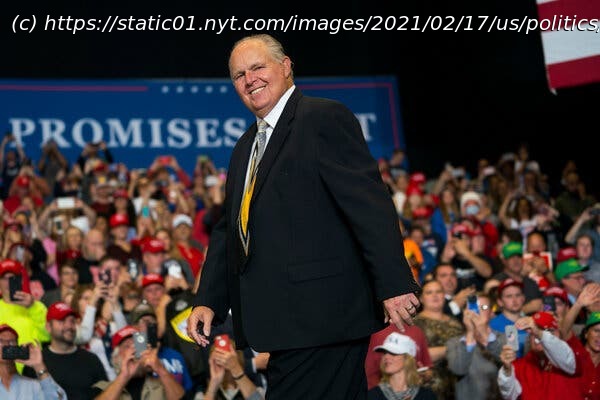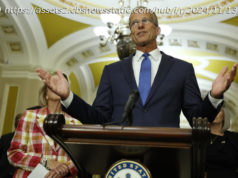Weaponizing conspiracy theories and bigotry long before Donald Trump’s ascent, the radio giant helped usher in the political style that came to dominate the Republican Party.
Rush Limbaugh was a uniquely merciless media voice whose influence frightened and awed presidents for three decades — often at moments of trauma for the nation and of political upheaval that they could trace back to something uttered through the combative radio host’s microphone. In 1992, as President George H.W. Bush faced a revolt from the right led by Patrick J. Buchanan, a rival Mr. Limbaugh had promoted, Mr. Bush extended an olive branch by inviting the host to stay overnight in the Lincoln Bedroom. Mr. Limbaugh returned the favor by leaking that the president had been so gracious, he carried his guest’s bag upstairs. In 1995, after Timothy McVeigh killed 168 people with a fertilizer bomb in Oklahoma City, President Bill Clinton called out the “promoters of paranoia” on the airwaves in a rebuke that was widely seen as directed at Mr. Limbaugh. And within minutes of the announcement of Mr. Limbaugh’s death on Wednesday, former President Donald J. Trump called Fox News to offer his condolences on live television. He praised his friend, a golfing buddy in Palm Beach, Fla., for backing up his spurious claims about having been cheated of victory in last year’s presidential election. Mr. Limbaugh wasn’t the first conservative media star to endorse Mr. Trump for president. But he was among the first to popularize — and normalize, for many Republican politicians and voters — the style of politics that would become synonymous with the Trump name. There was no person or subject that was off-limits for Mr. Limbaugh’s ire. Black people, gay men and lesbians, feminists, people with AIDS, the 12-year-old daughter of a president, an advocate for victims of domestic violence: All found themselves the subject of denigrating put-downs by Mr. Limbaugh over the years. He spun conspiracy theories about the supposed involvement of Mr. Clinton and his wife, Hillary, in the death of the former deputy White House counsel Vince Foster, and spread lies about former President Barack Obama’s birthplace. He insisted in 2009, for instance, that Mr. Obama “has yet to have to prove that he’s a citizen” and almost always referred to him on the air by using the former president’s middle name, Hussein, a trope that right-wing commentators used to evoke the false impression that he was not an American and was possibly a Muslim. Few media stars were as crucial in making disinformation, false rumors and fringe ideas the right’s new reality. And toward the end of the Trump presidency, Mr. Limbaugh’s willingness to indulge the paranoia among Mr. Trump’s most ardent supporters was especially powerful in misleading people to believe that bad news about their president — like his loss in November — was simply made up by his enemies or the result of a nefarious plot.
Home
United States
USA — Political Rush Limbaugh’s Legacy of Venom: As Trump Rose, ‘It All Sounded Familiar’






